Submitted:
23 August 2024
Posted:
23 August 2024
You are already at the latest version
Abstract
Keywords:
1. Introduction
2. Materials for Flexible Printed Heaters
2.1. Conductive Materials
2.2. Substrate Materials
3. Flexible Printed Heater Fabrication Methods
3.1. Screen Printing
3.2. Inkjet Printing
3.3. Role-to-Role Gravure Printing
4. Flexible Printed Heater Design and Temperature Control Mechanisms
5. Medical Applications and Performance Analysis of Flexible Printed Heaters
5.1. Medical Applications
5.2. Performance Analysis
6. Challenges
7. Future Directions and Opportunities
- Exploring novel conductive materials with excellent electrical and thermal conductivity at a self-regulating temperature close to human body temperature could increase the performance of the wearable heater and its usability for wearable medical applications.
- Incorporating vital sign monitoring sensors could advance the wearable printed heater to enable measurement of important parameters such as body temperature, oxygen saturation, respiration rate, heart rate, and others for effective medical follow-up.
- Multidisciplinary collaboration among researchers, healthcare professionals, industry, and regulatory bodies to enable the development of a regulatory standard for wearable printed heaters for medical applications. Conducting clinical trials and validation studies to demonstrate the efficacy, safety, and cost-effectiveness of printed heaters for specific medical applications is another critical step in this process. This will facilitate the utilization of FPHs for medical applications.
8. Conclusions
Author Contributions
Funding
Data Availability Statement
Acknowledgments
Conflicts of Interest
References
- Van Tellingen, C.; Tukiegn, C.V. , “Hyperthermia in ancient Rome - or nonpharmaceutical management of heart failure in antiquity,” Netherlands Hear. J., vol. 14, no. 11, p. 397, Nov. 2006, Accessed: Apr. 26, 2024. [Online]. Available: /pmc/articles/PMC2557307/?report=abstract.
- Celine, N.C.; Clifford, I.U. , “A Review of Heat Therapy in African Traditional Medicine,” J. Heal. Environ. Res., vol. 6, no. 3, p. 87, 2020. [CrossRef]
- “What evidence exists that describes the safe application of heat therapy in a healthcare context?,” 2016.
- Yildirim, N.; Ulusoy, M.F.; Bodur, H. , “The effect of heat application on pain, stiffness, physical function and quality of life in patients with knee osteoarthritis,” J. Clin. Nurs., vol. 19, no. 7–8, pp. 1113–1120, Apr. 2010. [CrossRef]
- Cao, T.; Shi, X.L.; Zou, J.; Chen, Z.G. , “Advances in conducting polymer-based thermoelectric materials and devices,” Microstructures, vol. 1, no. 1, p. null-null, Sep. 2021. [CrossRef]
- Weingand, K. , “The Physiologic Basis and Clinical Applications of Cryotherapy and Thermotherapy for the Pain Practitioner,” 2019. [CrossRef]
- Freiwald, J.; et al. , “A Role for Superficial Heat Therapy in the Management of Non-Specific, Mild-to-Moderate Low Back Pain in Current Clinical Practice: A Narrative Review,” Life, vol. 11, no. 8, Aug. 2021. [CrossRef]
- Clijsen, R.; et al. , “Local Heat Applications as a Treatment of Physical and Functional Parameters in Acute and Chronic Musculoskeletal Disorders or Pain,” Arch. Phys. Med. Rehabil., vol. 103, no. 3, pp. 505–522, Mar. 2022. [CrossRef]
- Kok, H.P.; et al. , “Heating technology for malignant tumors: a review,” Int. J. Hyperthermia, vol. 37, no. 1, p. 711, Jan. 2020. [CrossRef]
- Dunne, E.A.; O’Donnell, C.P.F.; Nakstad, B.; McCarthy, L.K. , “Thermoregulation for very preterm infants in the delivery room: a narrative review,” Pediatr. Res. 2024 956, vol. 95, no. 6, pp. 1448–1454, Jan. 2024. [CrossRef]
- Demtse, A.G.; et al. , “Hypothermia in Preterm Newborns: Impact on Survival,” Glob. Pediatr. Heal., vol. 7, 2020. [CrossRef]
- Fenta, B.; Biyazin, T.; Dagnaw, Y.; Dewey, R.S.; Yetwale, A. , “Neonatal hypothermia and associated factors in preterm neonates admitted to neonatal intensive care units in southwest Ethiopia,” J. Neonatal Nurs., vol. 29, no. 2, pp. 307–312, Apr. 2023. [CrossRef]
- Petrofsky, J.; et al. , “Moist Heat or Dry Heat for Delayed Onset Muscle Soreness,” J. Clin. Med. Res., vol. 5, no. 6, p. 416, 2013. [CrossRef]
- Chang, W.Y.; et al. , “Severe burn injury from the common Asian practice of heat application in patients with diabetic neuropathy,” Int. Wound J., vol. 19, no. 4, p. 845, May 2022. [CrossRef]
- Mun, J.H.; et al. , “The Factors Associated with Contact Burns from Therapeutic Modalities,” Ann. Rehabil. Med., vol. 36, no. 5, p. 688, 2012. [CrossRef]
- Gosselin, T.K. , “Thermal wounds following heating pad use,” Clin. J. Oncol. Nurs., vol. 7, no. 1, pp. 87–88, 2003. [CrossRef]
- Ege, G.Y.Ö.; Özcan, M. , “Heating-pad burn as a complication of abdominoplasty,” Br. J. Plast. Surg., vol. 56, no. 1, pp. 52–53, 2003. [CrossRef]
- Lowe, W.; Chaitow, L. , “Thermal modalities as treatment aids,” Orthop. Massage, pp. 27–42, Jan. 2009. [CrossRef]
- Bahadir, S.K.; Sahin, U.K.; Bahadir, S.K.; Sahin, U.K. , “A Wearable Heating System with a Controllable e-Textile- Based Thermal Panel,” Wearable Technol., Apr. 2018. [CrossRef]
- Bahadir, S.K.; Sahin, U.K.; Bahadir, S.K.; Sahin, U.K. , “A Wearable Heating System with a Controllable e-Textile- Based Thermal Panel,” Wearable Technol., Apr. 2018. [CrossRef]
- Caya, M.V.C.; De Pano, C.J.R.; Magpayo, J.G.S. , “Development of Wearable Wireless Heating E-Textile using Conductive Threads for Thermotherapy,” 2020 IEEE 12th Int. Conf. Humanoid, Nanotechnology, Inf. Technol. Commun. Control. Environ. Manag. HNICEM 2020, Dec. 2020. [CrossRef]
- Beeby, S.; et al. , “Optimization of Heating Performance of the Rib-Knitted Wearable Heating Pad,” Eng. Proc. 2023, Vol. 30, Page 1, vol. 30, no. 1, p. 1, Jan. 2023. [CrossRef]
- De Mey, G.; et al. , “Designing of conductive yarn knitted thermal comfortable shirt using battery operated heating system,” Tekst. ve Konfeksiyon, vol. 24, no. 1, pp. 26–29, 2014.
- Liu, Q.; Tian, B.; Luo, C.; Liang, J.; Wu, W. , “Printed Flexible Heaters-Based Thermotherapy Platform for Multiduty Thermal Management,” Adv. Mater. Technol., vol. 5, no. 8, Aug. 2020. [CrossRef]
- Fang, S.; Wang, R.; Ni, H.; Liu, H.; Liu, L. , “A review of flexible electric heating element and electric heating garments,” J. Ind. Text., vol. 51, no. 1, pp. 101S-136S, Jun. 2022.
- “The Basics of Flexible Printed Heaters | Machine Design.” Accessed: Jan. 31, 2024. [Online]. Available: https://www.machinedesign.com/leaders/medical-design/article/21159616/the-basics-of-flexible-printed-heaters.
- Islam, M.R.; et al. , “Fully printed and multifunctional graphene-based wearable e-textiles for personalized healthcare applications,” iScience, vol. 25, no. 3, p. 103945, Mar. 2022. [CrossRef]
- Liu, Q.; Tian, B.; Luo, C.; Liang, J.; Wu, W. , “Printed Flexible Heaters-Based Thermotherapy Platform for Multiduty Thermal Management,” Adv. Mater. Technol., vol. 5, no. 8, p. 2000278, Aug. 2020. [CrossRef]
- Claypole, A.; Claypole, J.; Bezodis, N.; Kilduff, L.; Gethin, D.; Claypole, T. , “Printed Nanocarbon Heaters for Stretchable Sport and Leisure Garments,” Materials (Basel)., vol. 15, no. 2, Jan. 2022. [CrossRef]
- Ye, C.; Zhao, L.; Yang, S.; Li, X. , “Recent Research on Preparation and Application of Smart Joule Heating Fabrics,” Small, vol. 2309027, pp. 1–32, 2023. [CrossRef]
- Mohammed, M.A.; Basirun, W.J.; Rahman, N.M.M.A.; Salleh, N.M. , “Electrochemical applications of nanocellulose,” Nanocellulose Based Compos. Electron., pp. 313–335, Jan. 2021. [CrossRef]
- Van Langenhove, L.; Puers, R.; Matthys, D. , “Intelligent textiles for protection,” Text. Prot., pp. 176–195, Jan. 2005. [CrossRef]
- Smith, D.R.; Fickett, F.R. , “Low-Temperature Properties of Silver,” J. Res. Natl. Inst. Stand. Technol., vol. 100, no. 2, p. 119, Mar. 1995. [CrossRef]
- Tomotoshi, D.; Kawasaki, H. , “Surface and Interface Designs in Copper-Based Conductive Inks for Printed/Flexible Electronics,” Nanomaterials, vol. 10, no. 9, pp. 1–53, Sep. 2020. [CrossRef]
- “Silver - Energy Education.” Accessed: Feb. 21, 2024. [Online]. Available: https://energyeducation.ca/encyclopedia/Silver.
- Zheng, Y.; Huang, X.; Chen, J.; Wu, K.; Wang, J.; Zhang, X. , “A review of conductive carbon materials for 3d printing: Materials, technologies, properties, and applications,” Materials (Basel)., vol. 14, no. 14, Jul. 2021. [CrossRef]
- Tiwari, N. ; Ankit; Rajput, M.; Kulkarni, M.R.; John, R.A.; Mathews, N., “Healable and flexible transparent heaters,” Nanoscale, vol. 9, no. 39, pp. 14990–14997, Oct. 2017. [CrossRef]
- Zhang, J.; et al. , “Silver Nanoparticles for Conductive Inks: From Synthesis and Ink Formulation to Their Use in Printing Technologies,” Met. 2022, Vol. 12, Page 234, vol. 12, no. 2, p. 234, Jan. 2022. [CrossRef]
- Shukla, D.; Liu, Y.; Zhu, Y. , “Eco-friendly screen printing of silver nanowires for flexible and stretchable electronics,” Nanoscale, vol. 15, no. 6, pp. 2767–2778, Feb. 2023. [CrossRef]
- Zeng, P.; et al. , “Screen-Printed, Low-Cost, and Patterned Flexible Heater Based on Ag Fractal Dendrites for Human Wearable Application,” Adv. Mater. Technol., vol. 4, no. 3, p. 1800453, Mar. 2019. [CrossRef]
- Lee, J.H.; et al. , “Cu Microbelt Network Embedded in Colorless Polyimide Substrate: Flexible Heater Platform with High Optical Transparency and Superior Mechanical Stability,” ACS Appl. Mater. Interfaces, vol. 9, no. 45, pp. 39650–39656, Nov. 2017.
- Lee, J.G.; et al. , “Highly flexible, stretchable, wearable, patternable and transparent heaters on complex 3D surfaces formed from supersonically sprayed silver nanowires,” J. Mater. Chem. A, vol. 5, no. 14, pp. 6677–6685, Apr. 2017. [CrossRef]
- Celle, C.; Mayousse, C.; Moreau, E.; Basti, H.; Carella, A.; Simonato, J.P. , “Highly flexible transparent film heaters based on random networks of silver nanowires,” Nano Res., vol. 5, no. 6, pp. 427–433, 2012. [CrossRef]
- Pang, S.; et al. , “Graphene as Transparent Electrode Material for Organic Electronics,” Adv. Mater., vol. 23, no. 25, pp. 2779–2795, Jul. 2011. [CrossRef]
- Xie, Y.; Wang, X. , “Thermal conductivity of carbon-based nanomaterials: Deep understanding of the structural effects,” Green Carbon, vol. 1, no. 1, pp. 47–57, Sep. 2023. [CrossRef]
- Wang, Y.; Weng, G.J. , “Electrical conductivity of carbon nanotubeand graphene-based nanocomposites,” Micromechanics Nanomechanics Compos. Solids, pp. 123–156, Jan. 2017.
- Cao, Q.; Rogers, J.A. , “Ultrathin Films of Single-Walled Carbon Nanotubes for Electronics and Sensors: A Review of Fundamental and Applied Aspects,” Adv. Mater., vol. 21, no. 1, pp. 29–53, Jan. 2009. [CrossRef]
- He, Q.; et al. , “Facile and ultrasensitive determination of 4-nitrophenol based on acetylene black paste and graphene hybrid electrode,” Nanomaterials, vol. 9, no. 3, Mar. 2019. [CrossRef]
- Kim, I.; et al. , “Selective Light-Induced Patterning of Carbon Nanotube/Silver Nanoparticle Composite to Produce Extremely Flexible Conductive Electrodes,” ACS Appl. Mater. Interfaces, vol. 9, no. 7, pp. 6163–6170, Feb. 2017.
- Cao, M.; Wang, M.; Li, L.; Qiu, H.; Yang, Z. , “Effect of Graphene-EC on Ag NW-Based Transparent Film Heaters: Optimizing the Stability and Heat Dispersion of Films,” ACS Appl. Mater. Interfaces, vol. 10, no. 1, pp. 1077–1083, Jan. 2018. [CrossRef]
- Pillai, P.S.; et al. , “A resistive ink based all-printed fabric heater integrated wearable thermotherapy device,” J. Mater. Sci. Mater. Electron., vol. 34, no. 16, pp. 1–9, 2023. [CrossRef]
- Tian, B.; Wu, W. , “Printed Stretchable Multifunctional E-textile for Wearable electronics,” 2021 5th IEEE Electron Devices Technol. Manuf. Conf. EDTM 2021, Apr. 2021. [CrossRef]
- “From Experiment to Final Print: Understanding Self-Regulation PTC Heaters.” Accessed: Apr. 18, 2024. [Online]. Available: https://www.techblick.com/post/from-experiment-to-final-print-understanding-self-regulation-ptc-heaters.
- Repon, M.R.; Mikučionienė, D. , “Progress in Flexible Electronic Textile for Heating Application: A Critical Review,” Mater. 2021, Vol. 14, Page 6540, vol. 14, no. 21, p. 6540, Oct. 2021. [CrossRef]
- “How substrates and inks impact in-store marketing | Imagine.” Accessed: Apr. 30, 2024. [Online]. Available: https://theimaginegroup.com/insights/printer-primer-part-3-how-substrates-and-inks-impact-in-store-marketing.
- Kim, P.K.; Chung, S.I.; Ha, T.G.; Jung, K. , “Transparent flexible heater with nano amorphous pattern,” J. Micromechanics Microengineering, vol. 29, no. 11, Sep. 2019. [CrossRef]
- Xie, S.; Li, T.; Xu, Z.; Wang, Y.; Liu, X.; Guo, W. , “A high-response transparent heater based on a CuS nanosheet film with superior mechanical flexibility and chemical stability,” Nanoscale, vol. 10, no. 14, pp. 6531–6538, Apr. 2018. [CrossRef]
- Zhang, N.; et al. , “A Novel Flexible Silver Heater Fabricated by a Solution-Based Polyimide Metalization and Inkjet-Printed Carbon Masking Technique,” ACS Appl. Electron. Mater., vol. 1, no. 6, pp. 928–935, Jun. 2019. [CrossRef]
- Bobinger, M.R.; et al. , “Flexible and robust laser-induced graphene heaters photothermally scribed on bare polyimide substrates,” Carbon N. Y., vol. 144, pp. 116–126, Apr. 2019. [CrossRef]
- Wang, Y.; et al. , “Electro-thermally driven flexible robot arms based on stacking-controlled graphite nanocomposites,” Carbon N. Y., vol. 152, pp. 873–881, Nov. 2019. [CrossRef]
- An, B.W.; et al. , “Stretchable, Transparent Electrodes as Wearable Heaters Using Nanotrough Networks of Metallic Glasses with Superior Mechanical Properties and Thermal Stability,” Nano Lett., vol. 16, no. 1, pp. 471–478, Jan. 2016. [CrossRef]
- Sun, W.J.; et al. , “Highly conductive and stretchable carbon nanotube/thermoplastic polyurethane composite for wearable heater,” Compos. Sci. Technol., vol. 181, Sep. 2019. [CrossRef]
- Zheng, S.G.; et al. , “Continuously prepared highly conductive and stretchable SWNT/MWNT synergistically composited electrospun thermoplastic polyurethane yarns for wearable,” pubs.rsc.orgY Li, B Zhou, G Zheng, X Liu, T Li, C Yan, C Cheng, K Dai, C Liu, C Shen, Z GuoJournal Mater. Chem. C, 2018•pubs.rsc.org, vol. 6, no. 9, p. 2258, 2018. [CrossRef]
- Xu, T.; Shen, W.; Lin, X.; Xie, Y.M. , “Mechanical Properties of Additively Manufactured Thermoplastic Polyurethane (TPU) Material Affected by Various Processing Parameters,” Polymers (Basel)., vol. 12, no. 12, pp. 1–16, Dec. 2020. [CrossRef]
- Gray, B.L. , “The Textile is the Substrate: Challenges of Direct-on-Fabric Wearables,” IFETC 2023 - 5th IEEE Int. Flex. Electron. Technol. Conf. Proc., 2023. [CrossRef]
- “Flexible Printed Heaters: A Revolution In Heating Technology.” Accessed: Apr. 16, 2024. [Online]. Available: https://almaxeis.com/flexible-printed-heaters/.
- Keneth, E.S.; Kamyshny, A.; Totaro, M.; Beccai, L.; Magdassi, S. “3D Printing Materials for Soft Robotics,” Adv. Mater., vol. 33, no. 19, May 2021. [CrossRef]
- Li, P.; Zhang, Y.; Zheng, Z. , “Polymer-Assisted Metal Deposition (PAMD) for Flexible and Wearable Electronics: Principle, Materials, Printing, and Devices,” Adv. Mater., vol. 31, no. 37, Sep. 2019. [CrossRef]
- Han, Y.; Cui, Y.; Liu, X.; Wang, Y. , “A Review of Manufacturing Methods for Flexible Devices and Energy Storage Devices,” Biosensors, vol. 13, no. 9, Sep. 2023. [CrossRef]
- Buga, C.; Viana, J.C.; Buga, C.; Viana, J.C. , “Inkjet Printing of Functional Inks for Smart Products,” Prod. Eng. Robust Control, Aug. 2022. [CrossRef]
- You, M.; Zhong, J.; Hong, Y.; Duan, Z.; Lin, M.; Xu, F. , “Inkjet printing of upconversion nanoparticles for anti-counterfeit applications,” Nanoscale, vol. 7, no. 10, pp. 4423–4431, Mar. 2015. [CrossRef]
- Liu, Q.; Tian, B.; Liang, J.; Wu, W. , “Recent advances in printed flexible heaters for portable and wearable thermal management,” Mater. Horizons, vol. 8, no. 6, pp. 1634–1656, Jun. 2021. [CrossRef]
- Kim, H.; Lee, S. , “Characterization of Electrical Heating Performance of CFDM 3D-Printed Graphene/Polylactic Acid (PLA) Horseshoe Pattern with Different 3D Printing Directions,” Polym. 2020, Vol. 12, Page 2955, vol. 12, no. 12, p. 2955, Dec. 2020. [CrossRef]
- “Film heater | User Interfaces | Quad Industries.” Accessed: Apr. 15, 2024. [Online]. Available: https://www.quad-ind.com/printed-electronics/film-heaters/.
- “Arc Length Formula - Formula To Calculate Arc Length With Solved Examples PDF | PDF | Distance | Angle.” Accessed: Apr. 15, 2024. [Online]. Available: https://www.scribd.com/document/482691601/Arc-Length-Formula-Formula-To-Calculate-Arc-Length-With-Solved-Examples-pdf.
- “10.3: Resistors in Series and Parallel - Physics LibreTexts.” Accessed: Apr. 15, 2024. [Online]. Available:https://phys.libretexts.org/Bookshelves/University_Physics/University_Physics_(OpenStax)/Book%3A_University_Physics_II_-_Thermodynamics_Electricity_and_Magnetism_(OpenStax)/10%3A_Direct-Current_Circuits/10.03%3A_Resistors_in_Series_and_Parallel.
- “Power Output of Flexible Heaters - Calculations and Temperature.” Accessed: Apr. 15, 2024. [Online]. Available: https://www.epectec.com/flexible-heaters/power-output.html.
- “Best Mechanisms to Control Flexible Heater Temperatures.” Accessed: Apr. 16, 2024. [Online]. Available: https://blog.epectec.com/best-mechanisms-to-control-flexible-heater-temperatures.
- Palaniyappan, T.K.; Yadav, V. ; Ruchira; Tayal, V.K.; Choudekar, P., “PID Control Design for a Temperature Control System,” 2018 Int. Conf. Power Energy, Environ. Intell. Control. PEEIC 2018, pp. 632–637, Jul. 2018. [CrossRef]
- Zeng, P.; et al. , “Screen-Printed, Low-Cost, and Patterned Flexible Heater Based on Ag Fractal Dendrites for Human Wearable Application,” Adv. Mater. Technol., vol. 4, no. 3, p. 1800453, Mar. 2019. [CrossRef]
- “Swansea technology helps power top British athletes to Tokyo success - Swansea University.” Accessed: Mar. 27, 2024. [Online]. Available: https://www.swansea.ac.uk/press-office/news-events/news/2021/09/swansea-technology-helps-power-top-british-athletes-to-tokyo-success.php.
- “The Importance of Flexible Heaters in the Medical Industry.” Accessed: Mar. 27, 2024. [Online]. Available: https://blog.epectec.com/the-importance-of-flexible-heaters-in-the-medical-industry.
- “Three Uses for Flexible Printed Heaters in the Medical Industry.” Accessed: Mar. 27, 2024. [Online]. Available: https://butlertechnologies.com/blog/flexible-printed-heaters-medical-industry.
- “Smart Textiles | Printed electronics | Quad Industries.” Accessed: May 02, 2024. [Online]. Available: https://www.quad-ind.com/printed-electronics/smart-textiles/.
- Li, Z.; et al. , “Facile fabrication of large-scale silver nanowire transparent conductive films by screen printing,” Mater. Res. Express, vol. 9, no. 6, p. 066401, Jun. 2022. [CrossRef]
- Tian, B.; et al. , “Multifunctional Ultrastretchable Printed Soft Electronic Devices for Wearable Applications,” Adv. Electron. Mater., vol. 6, no. 2, p. 1900922, Feb. 2020. [CrossRef]
- Shan, X.C.; Sunappan, V.; Salam, B.; Lok, B.K. , “Roll-to-Roll Gravure Printing of Electric Heaters on Polymeric Substrates,” 2020 IEEE 22nd Electron. Packag. Technol. Conf. EPTC 2020, pp. 210–212, Dec. 2020. [CrossRef]
- Cen, Z.H.; Shan, X.C.; Salam, B.; Lai, W.L.; Lok, B.K. , “Design of Flexible Printed Heater to Improve Uniform Heating,” Electron. Packag. Technol. Conf., pp. 649–653, Dec. 2019. [CrossRef]
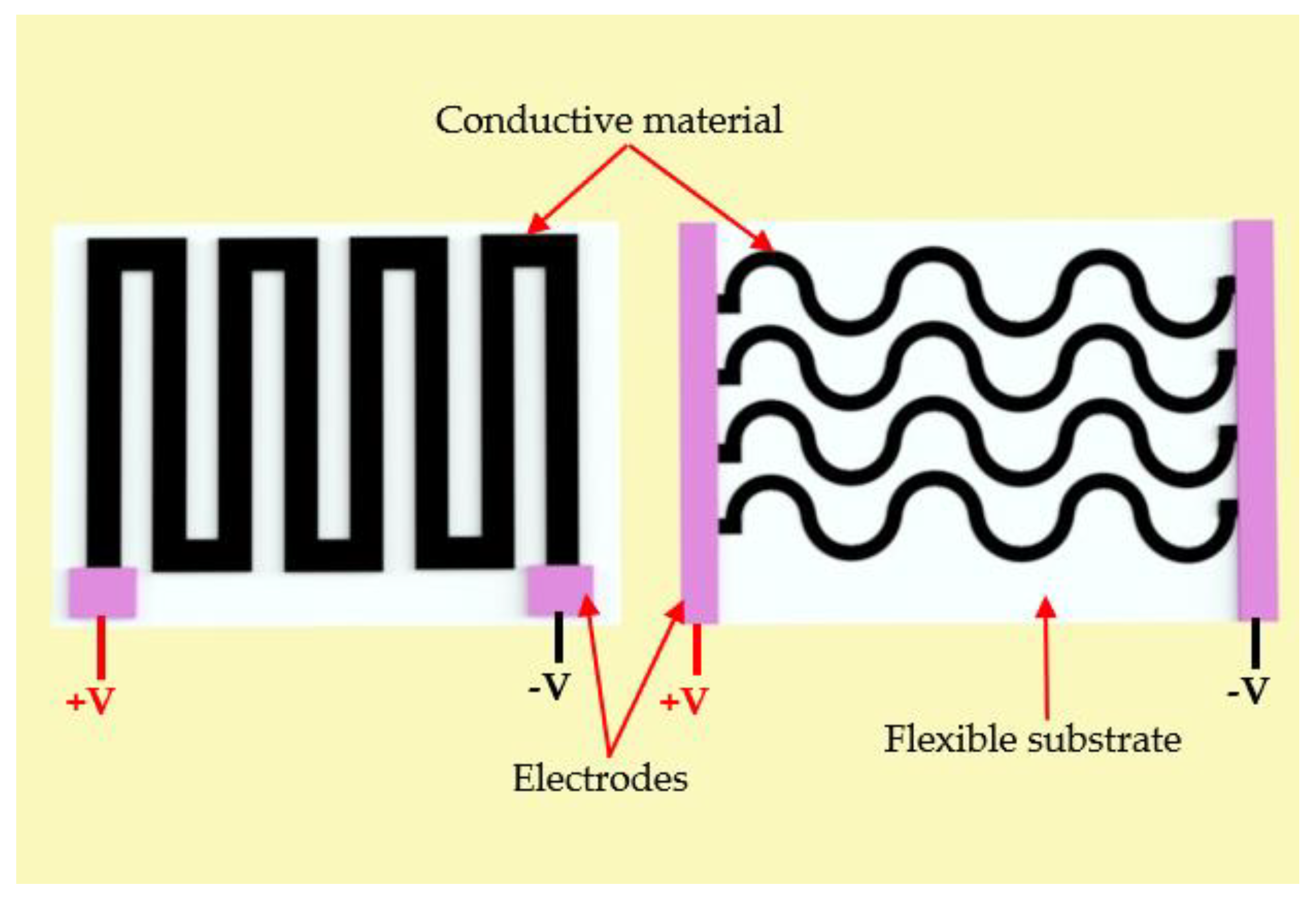
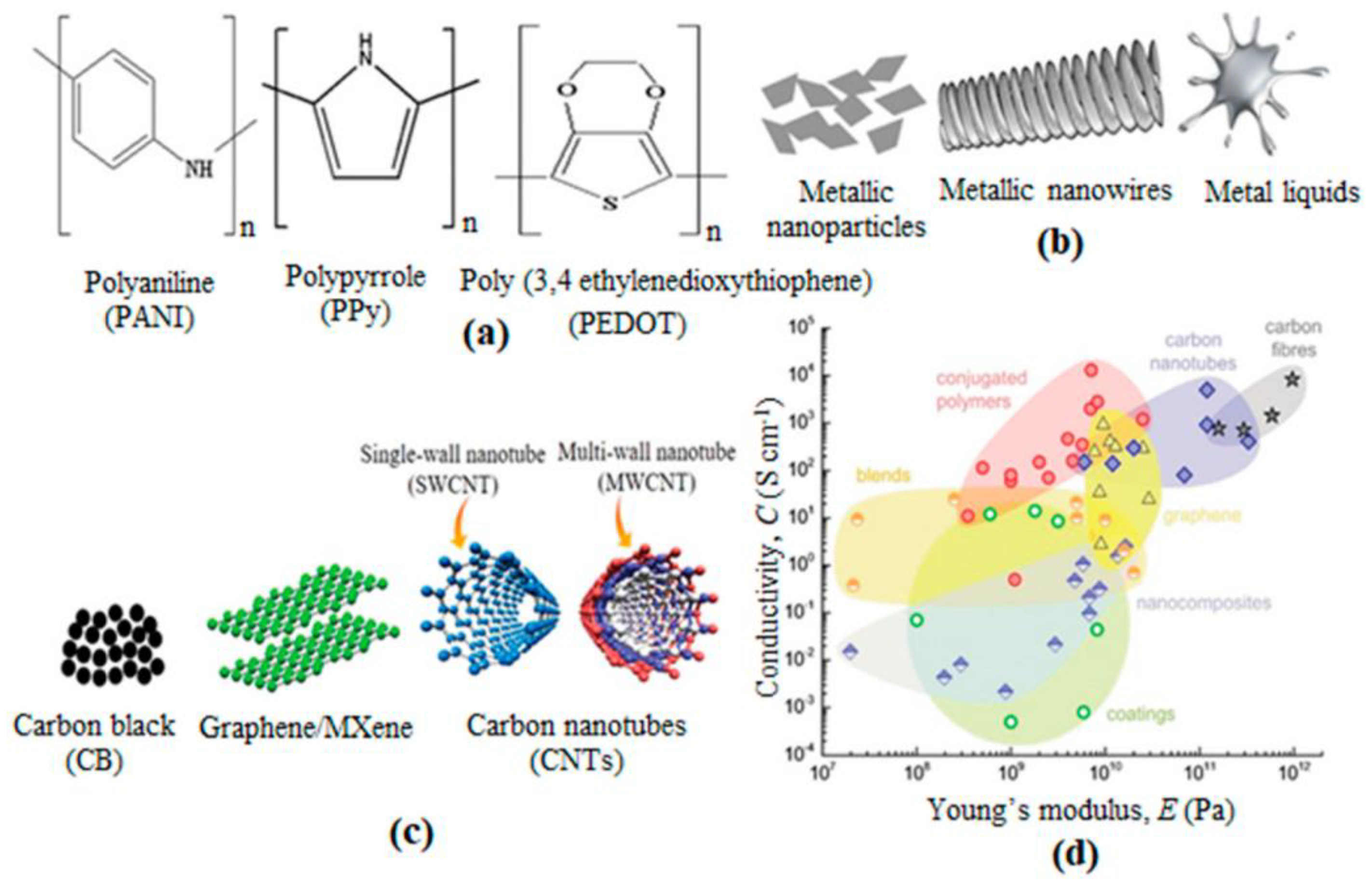
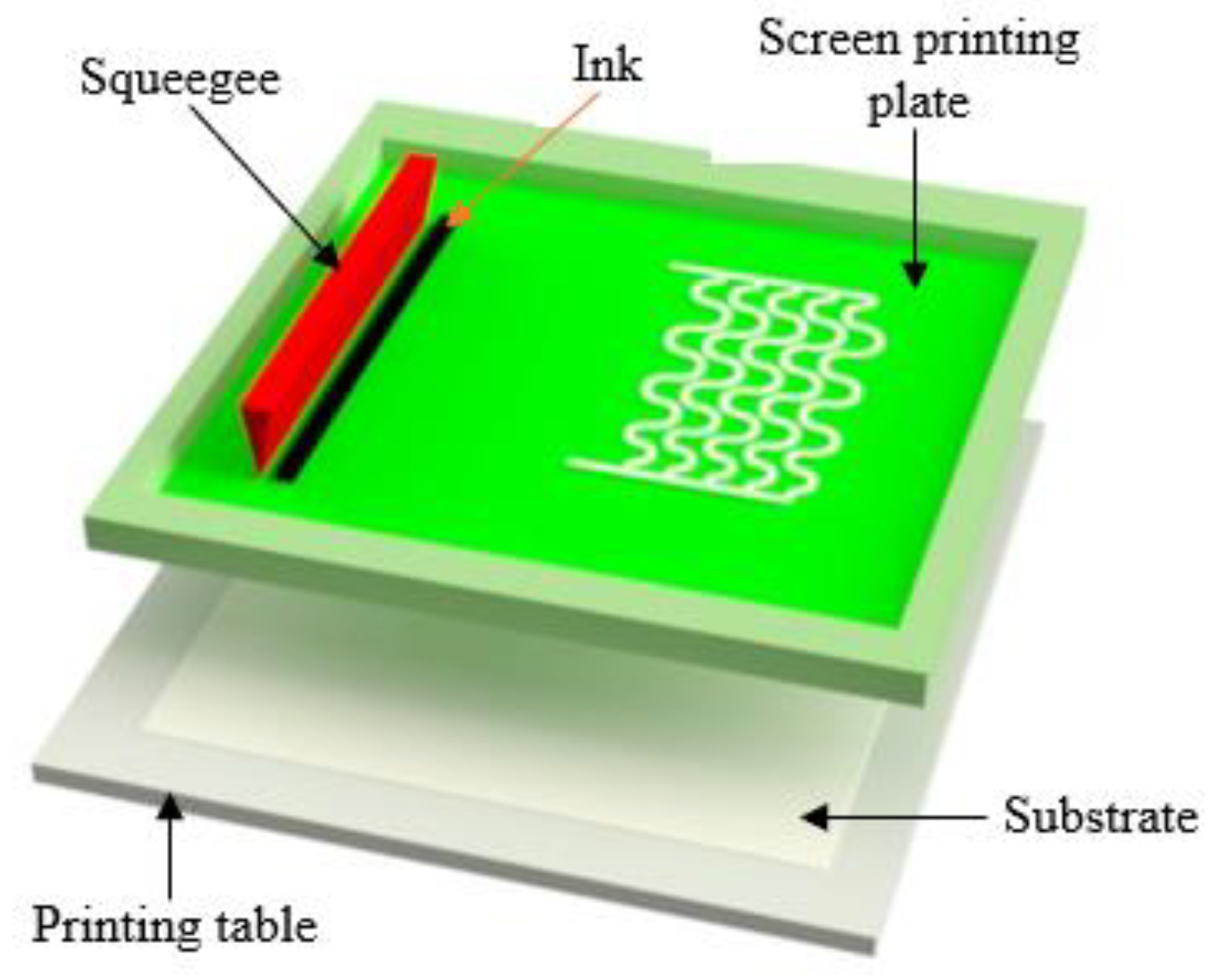
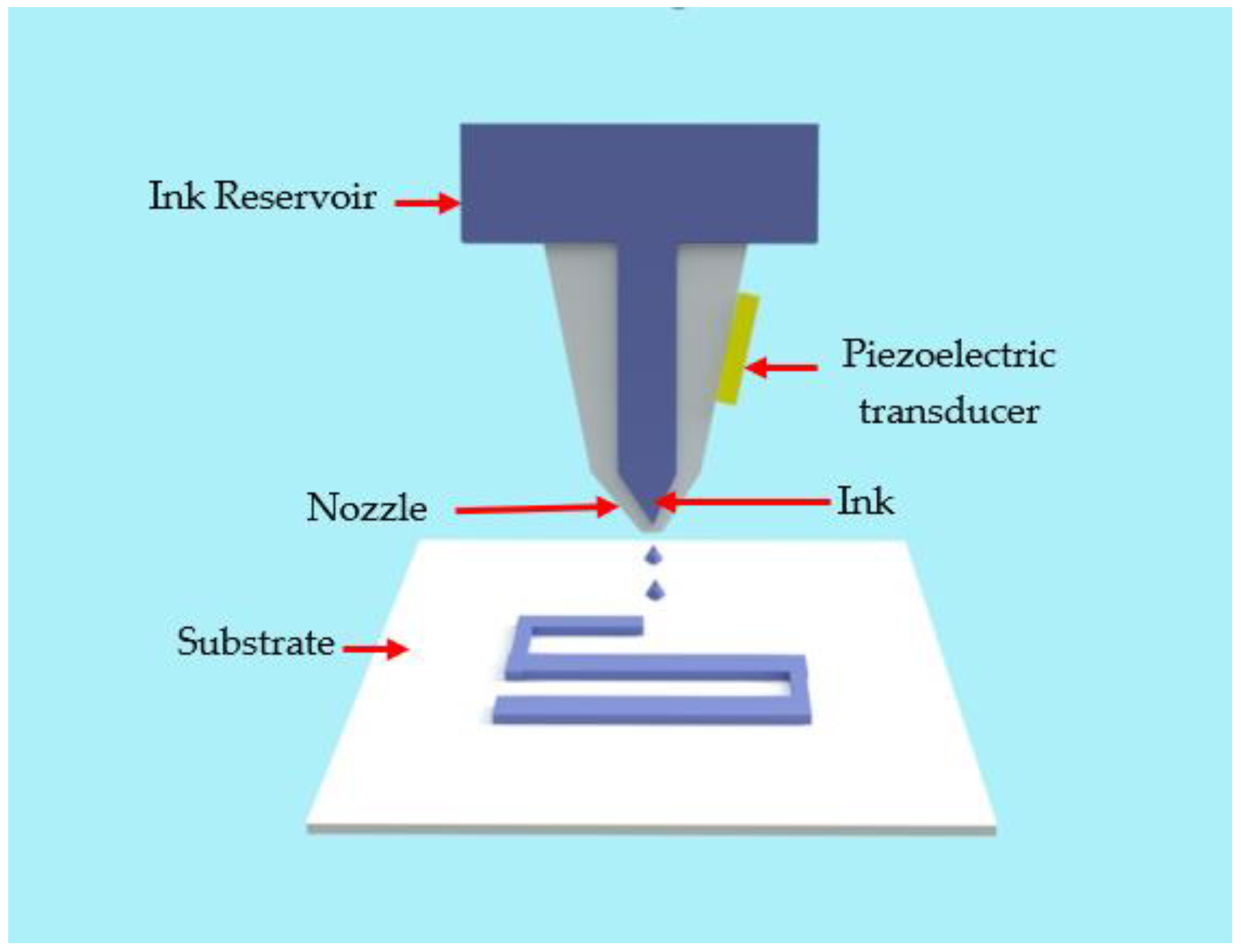
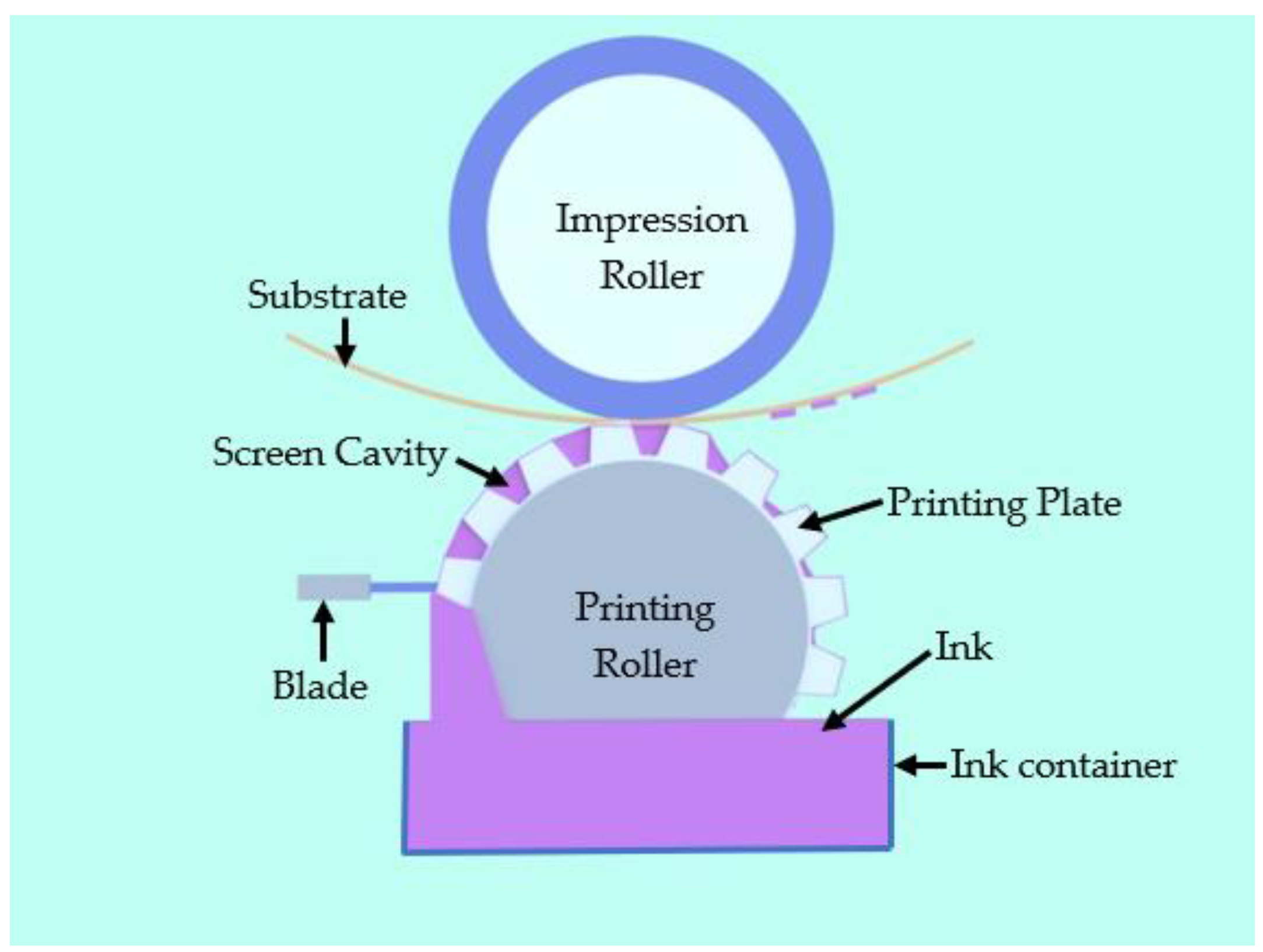
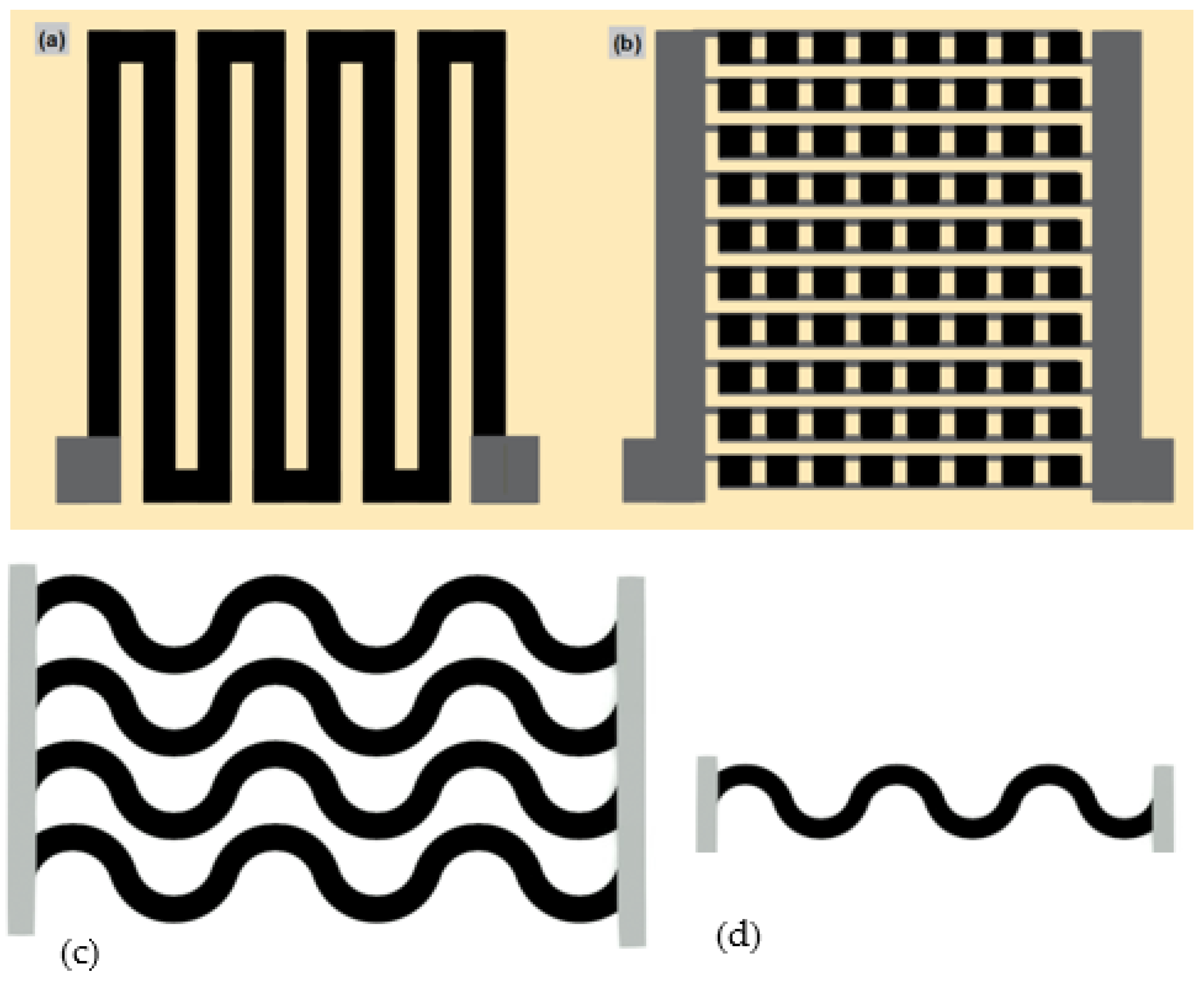
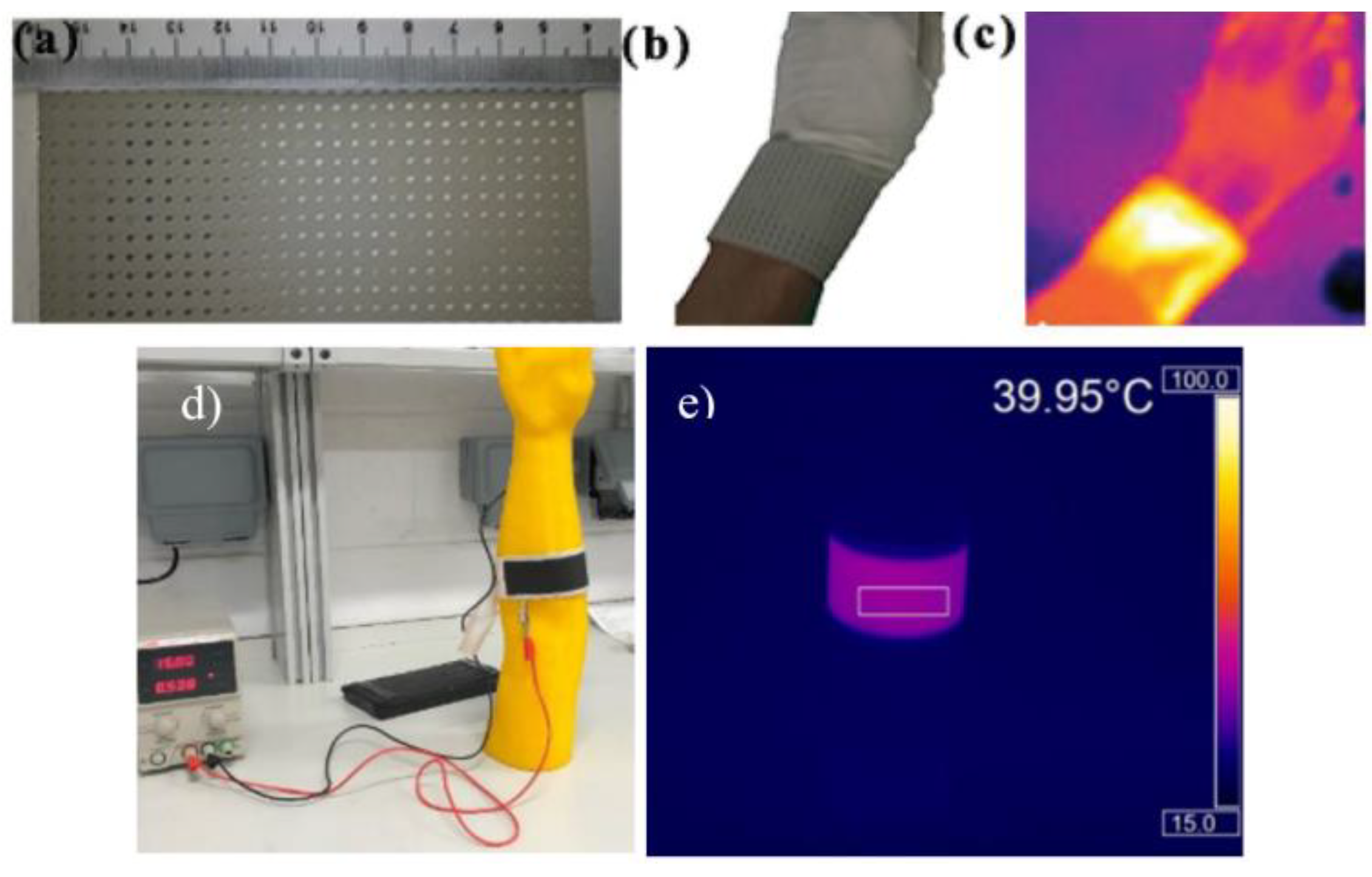
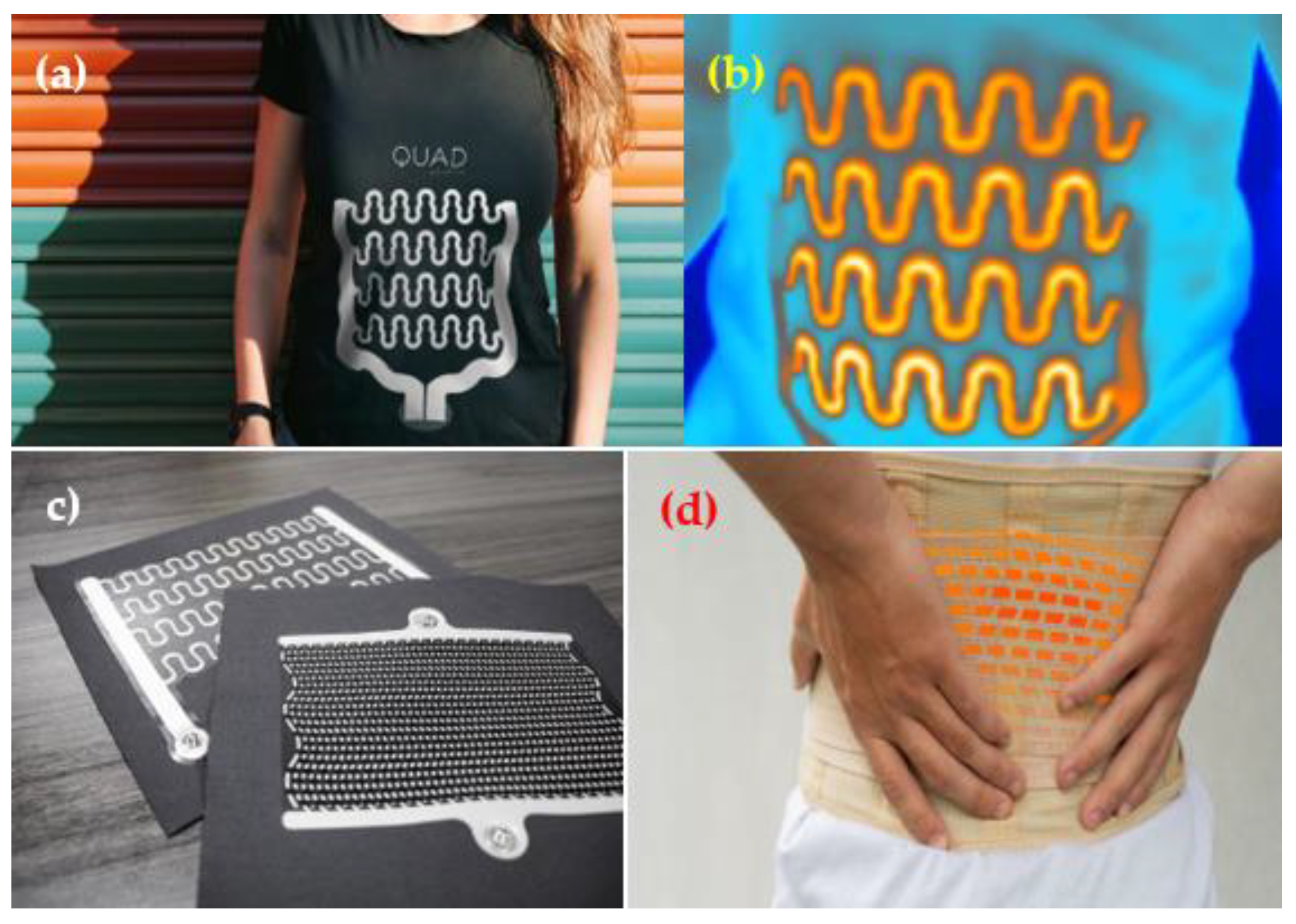
| Conductive material | Substrate | Printing method | Size (cm2) | Power supply (v) | Saturation temperature (oC) | Response time (s) | Power ( W ) | Durability | Ref. |
|---|---|---|---|---|---|---|---|---|---|
| AgFDs | PET | Screen printing | 12 x 5 | 5 | 38.3 | 35 | - | Stable after 2000 bending cycles | [80] |
| Silver-Carbor composite ink | PE | Screen printing | 5 x 5 | 5 | 50 | 60 | 0.811 | Maintained excellent performance under various bending radius | [51] |
| Nanocarbon ink with silver busbar | PET/TPU | Screen printing | 15 x 4 | 9 | 40 | 120 | 3.78 | Temperature decreases with applications of nominal strains | [29] |
| AgNW conductive ink | PET | Screen printing | 5 x 5 | 4 | 55 | 80 | 1.86 | Shows stable performance | [85] |
| Ag NWs/ PEDOT:PSS | PET | Inkjet printing | 5 x 2 | 6 | 85 | 30 | - | Less than 20% resistance variation after 10,000 bending cycles | [86] |
| AgFDs | Textile | Screen printing | 3x0.4 | 1 | 89 | 100 | - | Workable strain range of 105% | [52] |
| Silver particle-based ink | TPU&PET | R2R gravure printing | 9.8 x 4.3 | 4 | 78 | 240 | 6.67 | [87] |
Disclaimer/Publisher’s Note: The statements, opinions and data contained in all publications are solely those of the individual author(s) and contributor(s) and not of MDPI and/or the editor(s). MDPI and/or the editor(s) disclaim responsibility for any injury to people or property resulting from any ideas, methods, instructions or products referred to in the content. |
© 2024 by the authors. Licensee MDPI, Basel, Switzerland. This article is an open access article distributed under the terms and conditions of the Creative Commons Attribution (CC BY) license (https://creativecommons.org/licenses/by/4.0/).





